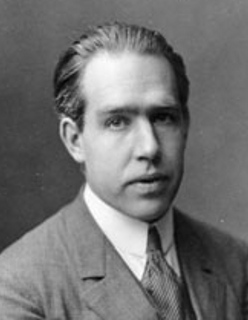Niels Bohr
Full Name: Niels Henrik David Bohr
AKA: Father of Quantum Theory
Birthdate: October 7, 1885
Birthplace: Copenhagen, Denmark
Date of Death: November 18, 1962
Occupation: Philosopher and Physicist
Profile: Awarded the 1922 Nobel Prize in Physics.
Website: https://www.nobelprize.org/prizes/physics/1922/bohr/biographical/
Number of Quotes: 29
A physicist is just an atom's way of looking at itself.
A triviality is a statement whose opposite is false. However, a great truth is a statement whose opposite may well be another great truth.
Accuracy and clarity of statement are mutually exclusive.
An expert is a man who has made all the mistakes that can be made in a very narrow field.
This reflects Bohr's view on the
nature of learning and expertise, suggesting that deep knowledge comes from encountering and overcoming error.
Einstein,
stop telling God what to do!
Every description of natural processes must be based on ideas which have been introduced and defined by the classical theory.
Every great and deep difficulty bears in itself its own solution. It forces us to change our thinking in order to find it.
Every sentence I utter must be understood not as an affirmation, but as a question.
Everything we call real is made of things that cannot be regarded as real.
How wonderful that we have met with a paradox. Now we have some hope of making progress.
This captures the essence of Bohr's approach to quantum
mechanics, where paradoxes (like wave-particle duality) were not roadblocks but clues pointing toward a deeper understanding of reality.
Humanity will... be confronted with dangers of unprecedented character unless, in due time, measures can be taken to forestall a disastrous
competition in such formidable armaments and to establish an international control of the manufacture and use of the powerful materials.
If quantum mechanics hasn't profoundly shocked you, you haven’t understood it yet.
It is very difficult to make an accurate prediction, especially about the future.
A witty remark often attributed to Bohr (and
sometimes to Danish cartoonist Storm P.), highlighting the inherent uncertainty in complex systems.
It is wrong to think that the task of physics is to find out how nature is. Physics concerns what we can say about nature.
This quotation is central to Bohr's philosophy of
quantum mechanics, emphasizing that science is not about an independent reality but about our description of observed phenomena.
Never express yourself more clearly than you are able to think.
A warning against the pretense of certainty in areas that are fundamentally vague or not yet fully understood.
No paradox, no progress.
No, no, you're not thinking; you're just being logical.
Prediction is very difficult, especially if it’s about the future.
Technology has advanced more in the last thirty years than in the previous two thousand. The exponential increase in advancement will only continue.
The best weapon of a dictatorship is secrecy, but the best weapon of a democracy should be the weapon of openness.
The opposite of a correct statement is a false statement. But the opposite of a profound truth may well be another profound truth.
This illustrates Bohr's principle of complementarity, where
two seemingly contradictory descriptions (like the wave and particle nature of light) are both necessary for a complete understanding.
There are some things so serious you have to laugh at them.
There are trivial truths and great truths. The opposite of a trivial truth is plainly false. The opposite of a great truth is also true.
A variation on the previous idea, further elaborating on the nature of profound, complementary truths.
Those who are not shocked when they first come across quantum theory cannot possibly have understood it.
Bohr famously said this to
emphasize how quantum mechanics fundamentally overturns our classical, intuitive notions of how the world works.
We are all agreed that your theory is crazy. The question which divides us is whether it is crazy enough to have a chance of being correct.
Said to Wolfgang Pauli about a new theory, this reflects Bohr's
belief that the quantum world required ideas that were radically different from classical physics.
When it comes to atoms, language can be used only as in poetry. The poet, too, is not nearly so concerned with describing facts as with creating images.
While the finish given to our picture of the world by the theory of relativity has already been absorbed into the general scientific consciousness,
this has scarcely occurred to the same extent with those aspects of the general problem of knowledge which have been elucidated by the quantum theory.
You see something; then you suddenly see that it is the opposite. You stop seeing; you start thinking.
This speaks to the cognitive shift required to move from simple observation to
abstract, theoretical understanding, especially in the face of contradictory evidence.
Your theory is crazy, but it's not crazy enough to be true.

